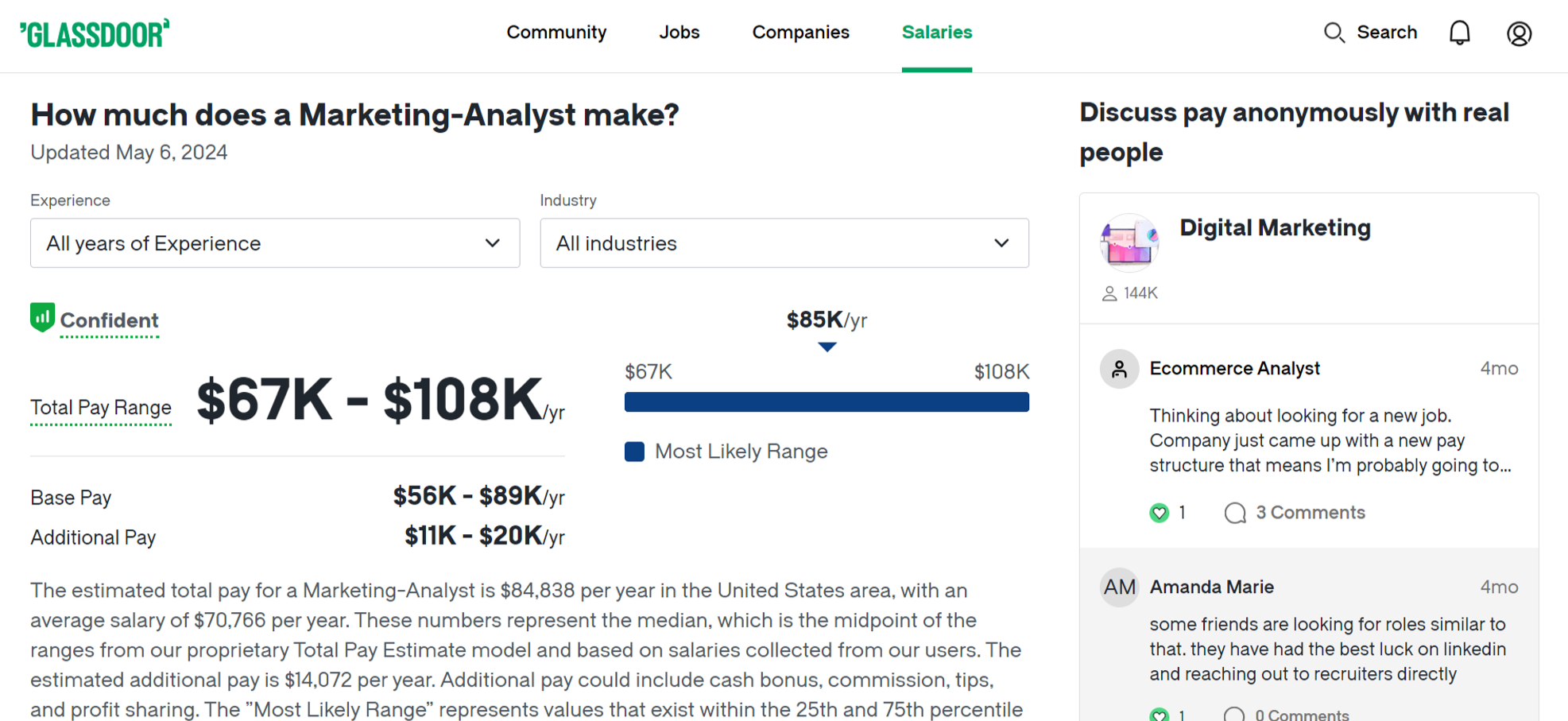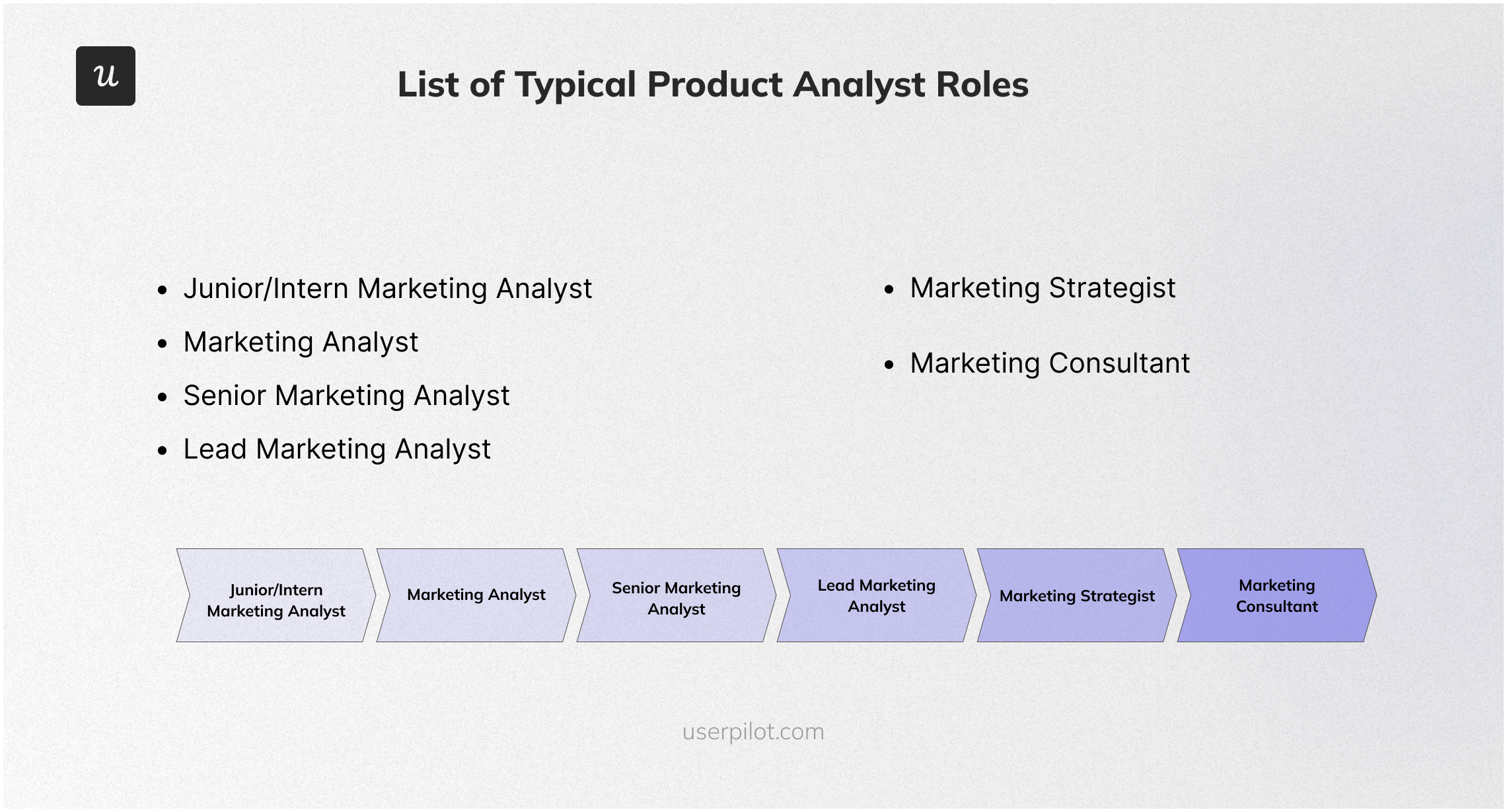
What is a marketing analyst?
A marketing analyst is a professional who carries out market research for a product, tracks trends, and identifies growth opportunities for the company.
A marketing analyst helps you discover how best to position your SaaS product in the market to attract the right growth opportunities. After making these findings, the marketing analyst reports them to stakeholders and other members of the marketing team to guide decision-making.
What does a marketing analyst do?
A marketing analyst carries out market research to spot trends, monitor performance, and pinpoint opportunities for the company to grow.
In carrying out this market research, the marketing analyst interviews product users and collects data using surveys, opinion polls, and user research tools like Userpilot to enable SaaS companies to make data-driven decisions.
Marketing analyst’s main responsibilities
A marketing analyst is an important individual in the company who provides insights into market conditions for the stakeholders to enable them to make the right decisions.
Here are some of the main responsibilities and duties of a marketing analyst in a SaaS company:
- Research: Market research is one of the core duties of a marketing analyst. A market analyst researches the market to identify trends and performances the company can take advantage of in its marketing strategy. A marketing analyst carries out user behavior research by identifying user needs and getting feedback from them directly. A marketing analyst also performs research on competitors by analyzing their strategy and gaps to explore.
- Data analysis and interpretation: After gathering different data from data sources, the marketing analyst analyses and visualizes the data. Data analysis and interpretation is one of the crucial responsibilities of a marketing analyst, there is, therefore, the need for proficiency in tools like Tableau, SQL, R, Google Charts, and Excel.
- Data Reporting: When a marketing analyst analyses and interprets the data obtained, they visualize it by transforming it into graphs, charts, and PowerPoint presentations and report these findings to stakeholders.
- Collaboration with other teams: The marketing analyst collaborates with other members of the team, such as the marketing manager, to develop and optimize marketing campaigns for more conversions.
- Reporting on marketing campaigns: A marketing analyst also measures the impact of marketing campaigns and reports. This includes conversion rate, lead generation, website traffic, social media engagement and shares, customer acquisition cost, click-through rates, and ROI on the marketing campaigns. They monitor the company’s marketing channels and campaigns and report on them.
- Identification of growth opportunities: Using the data obtained from the research, the marketing analyst finds growth opportunities and presents them to stakeholders.
- Tools Research: A marketing analyst researches tools that will benefit the marketing processes of the company. This ranges from tools for better attribution to social media marketing tools and product research tools.
- Trends Monitoring and Forecasting: A marketing analyst also stays on top of the different trends in the market, identifies opportunity gaps early, and helps the company maximize them.
Marketing analyst salary
According to Glassdoor, the median estimated total pay of a marketing analyst in the United States is $84,838 per year, with an estimated salary of $70,766.
However, the salary of a marketing analyst varies due to some factors such as years of experience, the sector you work in, and where you live. In this section is a detailed breakdown of the salary of a marketing analyst, starting with the level of experience:
- Junior Marketing Analyst (1-3 years): $64K – $95K/year
- Senior Marketing Analyst (4-6 years): $67K – $104K/year
- Lead/Principal Marketing Analyst: (7+ years): $71K/year and above
Secondly, your industry of work affects your salary. For instance, if you work in the healthcare sector, your salary may differ from when you are working in the Information and Technology sector.
According to Glassdoor, here are the top 3 sectors where the marketing analyst earns the most total pay:
- Information Technology: $109,919/year
- Energy, Mining, and Utility: $94,835/year
- Pharmaceutical and Biotechnology: $92,329/year
Your location also affects your salary, especially with remote working where company employees may live in different countries around the world, and with different standards of living. Here are the midpoint salaries for some of the biggest cities in the United States.
- San Francisco: $91,662/year
- New York: $104,135/year
- Boston: $73,398/year
- Washington DC: $77,160/year
- Chicago: $83,533/year

Marketing analyst career path
The marketing analyst career allows for room for growth as your skillset and years of experience increase. Here is a typical career path for a marketing analyst:
- Junior/Intern Marketing Analyst: This is a junior role where you get to learn how to use market research and data analysis tools. You also learn to learn more about marketing channels and how to monitor performance and gather marketing data.
- Marketing Analyst: The marketing analyst is a more senior position where you take on more responsibilities, such as marketing data analysis, visualization, and reporting. In this role, you report to the senior/lead marketing analyst.
- Senior/Lead Marketing Analyst: The Senior/Lead marketing analyst oversees all activities related to marketing analysis for the company.
- Marketing Strategist: From the data obtained from marketing analysis, the marketing strategist develops growth strategies to guide and improve the company’s marketing. Using their expertise, they also forecast future market trends.
- Marketing Consultant: The marketing consultant role is one of the highest roles in marketing analysis, where you are consulted for marketing strategies due to your expertise. You vet marketing data and strategies to identify growth opportunities.

Best practices for being a great marketing analyst
To become a marketing analyst who excels at their tasks and stands out in the marketing team, here are the best practices to follow:
- Keen eye for details: Having a keen eye for details is essential to being a great marketing analyst as it enables you to draw relevant insights from data. Being detail-oriented means you can spot small trends and make sense of them.
- Goal setting and KPI monitoring: Marketing analysis involves interfacing with stakeholders, other members of the marketing team, and sometimes users in the process of research. Goal setting helps you prioritize what matters at each point in time. KPI monitoring also helps you keep track of your performance and identify where you are lagging and where to improve.
- Researching well and choosing the right tools: The right marketing research tools give you valuable insights, while the right operations tools make your work efficient and organized. Before you invest in tools, carry out enough research about them and ensure they are the perfect fit for you.
- Effective communication: As a marketing analyst, you should be able to present your insights. You can take online courses on communication on platforms like Udemy and Coursera to improve your communication skills.
- Willingness to Learn: Openness to learn new skills, tools, and research methods makes for a great marketing analyst. Marketing is constantly evolving, and you must be ready to evolve with it to stay relevant.
Marketing analyst FAQs
- What qualifications do you need to become a marketing analyst?
Most companies ask that their marketing analyst have a degree in either computer science, marketing, statistics, or business administration. However, most companies are willing to waive that requirement if you come with enough skills and experience.
- Is marketing analyst a good career?
Yes, marketing analyst is a good career, and the demand for them is currently on the rise. More companies are leaning toward being data-driven because of the constantly evolving nature of the market.
- What does an entry-level marketing analyst do?
An entry-level marketing analyst assists senior marketing analysts in research, data analysis, and monitoring. In the process of doing this, they gain hands-on experience with technical skills. They also gain experience with market research like Userpilot and Supermetrics and data analysis tools like Power BI and Tableau.
- What is the scope of a marketing analyst?
The scope of a marketing analyst includes carrying out market research and gathering data, analyzing the data, and drawing meaningful insights to guide the company’s marketing decisions. They also monitor the company’s marketing performance.
Conclusion
We hope this guide has provided you with valuable insights into the roles, responsibilities, and rewards associated with this role.
Looking into tools for marketing analysts? Userpilot is an all-in-one product platform with engagement features and powerful analytics capabilities. Book a demo to see it in action!






